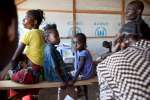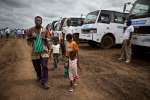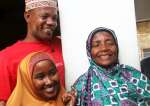- Text size
 |
|  |
|  |
| 
- Français
New Year heralds fresh beginning for Rwandan refugees leaving Pakistan
Telling the Human Story, 2 January 2013
ISLAMABAD, Pakistan 2 Jan (UNHCR) – Muhammad Saeed and his family flew out of Pakistan just in time to see the New Year dawn in their home country Rwanda for the first time in over twenty years.
Saeed, 44, came to Pakistan in 1991 to study but could not return to Rwanda due to the 1994 genocide in his homeland and was registered as a refugee with UNHCR. He left on New Year's Eve to Gitarama province in central Rwanda with his wife Benimana Alice Aliya, 34, and four children. They were the first Rwandans repatriated under the UNHCR-facilitated voluntary repatriation programme from Pakistan.
Two of Saeed's siblings and many cousins were among the many thousands killed in the war in Rwanda. "I lost contact with my family. I had no idea if they were dead or alive until early 2011 when I finally contacted my family with the help of a Rwandan foreign office official who was on an official visit to Pakistan," said Saeed.
In an impoverished neighbourhood in Pakistan's capital Islamabad, a dark, smelly room was what the family called home for several years.
"There hasn't been any single night I did not dream about going back home," the soft-spoken Aliya said. Surrounded by piles of family belongings, she carefully packed what they were taking in a small bag.
Aliya, also a Rwandan, was studying at the same university as Saeed. They married in 2003 and started their family. "I felt complete when I met Aliya, she was like a waft of fresh air in my life after all those lonely years I spent in Pakistan," said Saeed.
The bliss of returning after 21 hard years in exile was overwhelming, showing in their eyes and smiles. Saeed lived hand-to-mouth all those years, his only income, other than the UNHCR Substance Allowance, was from teaching Arabic and Quranic lessons. With his family expanding, Saeed said: "it was becoming increasingly difficult for me to make ends meet. Rent, schooling and everyday expenses became difficult to manage."
Soon after Saeed established contact with his family and learned that his parents were alive and eager to see him, he decided to return home. But processing Saeed's application for voluntary repatriation was prolonged because of the absence of a Rwandan embassy in Pakistan.
UNHCR facilitated his return in coordination with the International Committee of the Red Cross (ICRC) and the International Migration Organization (IOM) through the Rwandan Embassy in China. Saeed and Aliya's dream became reality when ICRC issued a special laissez-passer and IOM helped obtain permission from the Pakistan Foreign Ministry for their travel.
Born and raised in Pakistan, Rwanda is an alien land for the couple's two daughters and two sons. "They have seen Africa on National Geographic and ask all kind of funny questions about Africa." Saeed said. "Bilqees (the nine-year-old daughter) asks me, do they have Roti (Pakistani bread) and Biryani in Rwanda? Will we also have to eat spiders?" Aliya said, laughing.
"I won't look back and will never mention or think about all the difficult years we lived here once I land in Rwanda," Aliya said. Saeed added: "I want my children to grow in their country; I want a brighter future for them."
"Voluntary repatriation is our most preferred solution to end a refugee situation. Facilitating the return of uprooted families and persons is always a great pleasure," said UNHCR's Assistant Representative for Protection, Monique Ekoko, in Islamabad. "Saeed's return marks the start of the end of being a refugee and I wish them good luck for a new beginning."
In addition to the 1.65 million Afghan refugees, Pakistan hosts some 750 non-Afghan refugees registered with UNHCR, mainly from Somalia, Iran and Iraq. In 2012 UNHCR facilitated the return of 13 non-Afghan refugees from Pakistan: Saeed's family and seven Algerians.
Saeed's plans include writing a memoir about his life as a refugee in Pakistan, "I want to let the people of the world know how hospitable and generous the people of Pakistan are. I will pay them tribute through a memoir; I intend to write soon, InshaAllah." Saeed said.
By Duniya Aslam Khan in Islamabad, Pakistan










































